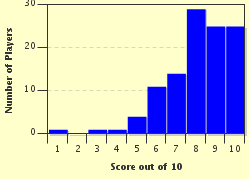Quiz Answer Key and Fun Facts
1. 'Lo, How a Rose E'er Blooming' was sung in a 1970 blockbuster Academy Award winning film starring Ali MacGraw and Ryan O'Neal. What was the name of the movie?
2. 'Blest Be the Ties that Bind' was written in 1782 and almost 160 years later, it was sung in an Academy Award nominated movie starring Martha Scott and William Holden. What was the name of the 1940 movie?
3. 'When the Roll is Called Up Yonder' was sung in the 1941 Academy Award winning movie 'Sergeant York'. The hymn was written in 1893 by James M. Black who spent much of his adult life in an American state, home of two National Hockey League teams, the Penguins and the Flyers. What is the state?
4. 'Leaning On the Everlasting Arms' was written by Elisha Hoffman in 1887 and in 1943 it was sung in an Academy Award nominated movie starring Mickey Rooney. What was the name of the movie?
5. 'Nearer, My God, To Thee' is connected to two movies with Oscar connections. It was sung at the end of the 1936 movie 'San Francisco', nominated for several Academy Awards. It was also featured instrumentally in an Oscar winning movie in 1997 starring Leonardo DiCaprio and Kate Winslet. What is the name of the 1997 movie?
6. A mathematics question: 'Onward Christian Soldiers' was written by Sabine Baring-Gould in 1865 and seventy-seven years later it was sung at the end of the Academy Award-winning movie 'Mrs. Miniver'. What year was 'Mrs. Miniver' released?
7. The hymn 'Jerusalem' was featured in a 1981 Academy Award winning movie about two men aspiring to represent Great Britain as runners in the 1924 Summer Olympics in Paris. What was the title of the movie?
8. 'The Son of God Goes Forth to War' was sung in a 1975 Academy Award nominated movie directed by John Huston and starring Sean Connery, Michael Caine, Saeed Jaffrey, and Christopher Plummer. What was the name of the movie?
9. 'Blessed Assurance' is a popular hymn written by a woman who was blind and was known as the Queen of the Hymn Writers. Long after her death, the hymn was sung in two Hollywood movies that won Academy Awards back-to-back. The award winning movies are 'Places in the Heart' in 1984 and 'The Trip to Bountiful' in 1985. Who is the writer of 'Blessed Assurance'?
10. 'For the Beauty of the Earth' was sung in a 1994 Academy Award nominated movie about four sisters growing up in Concord, Massachusetts, during and after the American Civil War. What is the title of the movie?
Source: Author
Cowrofl
This quiz was reviewed by FunTrivia editor
agony before going online.
Any errors found in FunTrivia content are routinely corrected through our feedback system.

